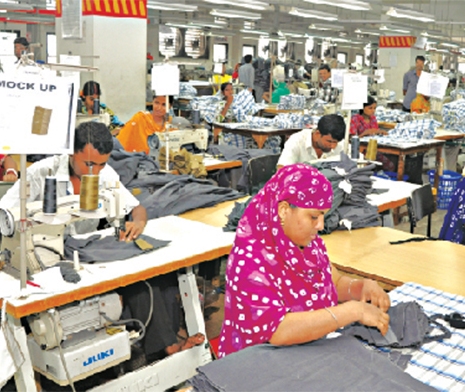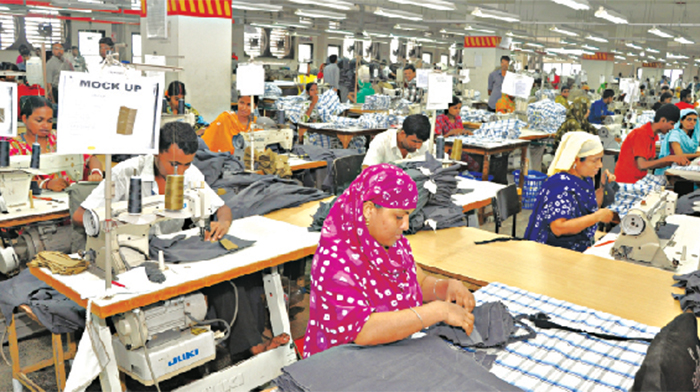
A recent study suggests that Bangladesh has lost its appeal as a top RMG market for many global brands because of the political unrest in the country. All three South Asian frontier markets: Sri Lanka, Bangladesh and Pakistan, experienced the steepest declines in corporate sentiment, says the latest WSJ/FSG Frontier Market Sentiment Index released.
In 2014, export earnings registered slow growth due to the impact of political uncertainty and two major industrial accidents viz, Tazreen Fashions fire and Rana Plaza building collapse that claimed several lives. In the first six months of 2014 export earnings registered single-digit growth and in the last five months, the figure registered below one per cent growth. Export earnings in January-June period amounted to $14.42 billion, according to the statistics of the Export Promotion Bureau.

In the second half of 2014 the readymade garment sector straggled with shortfall of order due to non- compliance issues as after Rana Plaza tragedy buyers shifted their orders from the factories housed in shared buildings. The export earnings in the July-November period of 2014 grew by only 0.92 per cent to $12.07 billion. Why Bangladesh is losing appeal Interestingly, export data shows the share of RMG has increased in value terms. In 2009 it was $1,192 million which has gone up to $24,583 million in 2014. In per cent terms it has grown from 78.84 per cent in 2009 to 80.85 per cent in 2014. However, growth percentage has been declining in 2009-’10 growth was 24.91 per cent which has gone down to 4.61 per cent in 2013-’14. One major reason affecting the country’s exports is the ongoing political unrest and the opposition party demanding fresh national elections. Other reason is the slow implementation of infrastructure projects and lack of economic reforms.
Top global brands and retailers are seeking alternatives to Bangladesh as the ongoing blockade is hampering timely shipment of garments. Moreover buyers are not willing to travel to Bangladesh to check samples because of possible arson attacks on vehicles, so they are now asking garment makers to send samples to the US. America is the single largest export destination for Bangladesh's garment. In fiscal 2013-14, Bangladesh exported garments worth $5.14 billion to the US, reveal Export Promotion Bureau data.
Almost 11 garment factories have lost $15.1 million between January 14 and January 24 due to the ongoing blockade, says the Bangladesh Garment Manufacturers and Exporters Association (BGMEA). The losses include order cancellation, discount, air shipment charges, delayed shipment and excess transportation costs. In 2013, the sector had to bear air shipment bills worth Tk 5,000 crores and offer discounts worth Tk 9,000 crores because of political unrest. Garment makers or their representatives are forced to travel to Hong Kong, China, India, Thailand and European nations at their own expenditure to attend meetings that were initially planned to take place in Dhaka, leading to further concerns over the country’s inability to emerge as a strong sourcing nation.
According to Rahul Mehta, President International Apparel Federation & C Clothing Manufacturers Association of India, when it comes to Bangladesh, though garments constitute 85 percent of their exports, buyers are putting pressure on Bangladeshi factories to improve wages, labour and safety standards but the question is when standards improve, will Bangladesh be as competitive as today with many buyers already looking at other sourcing options. Ways to deal with the crisis BGMEA in a recent letter to the Ministry of Commerce (MoC) requested the government to allocate closed and loss-making state-owned enterprises (SoEs) to relocate their factories by creating small-sized apparel zones. The industry body seeks SoEs located near the Dhaka-Chittagong Highway for the purpose.
The idea is to move apparel making factories to safer places quickly. Since SoEs have gas and electricity connections, the factories can begin their apparel production immediately after relocation of units. In the letter the BGMEA mentioned that many of the apparel factories have been partly or fully closed because of the ongoing inspection carried out by different local and foreign agencies to check compliance factors.
Experts opine compliance issues and avoiding the possible political uncertainty will be the key challenges the country will have to focus to up its positioning in global readymade garment sector in 2015. The country’s export earnings largely depend on the RMG sector, so they will have to really work towards managing stability in the sector in the New Year.
www.bgmea.com.bd











